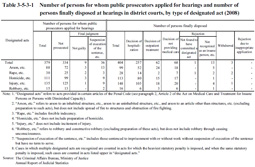| Previous Next Index Image Index Year Selection | |
|
|
1. Hearing The Act on Medical Care and Treatment for Insane Persons, etc. covers [1] persons not prosecuted due to being deemed to have committed the designated acts (acts provided in certain articles of the Penal Code including homicide, etc.) but to be insane or have a diminished capacity, and [2] anyone found not guilty for the designated acts in a final judgment on the grounds of being insane or given a mitigated sentence on the grounds of having a diminished capacity (excluding the case of being sentenced to imprisonment with or without work without suspension of execution of the sentence and also having certain term to be executed).A hearing is held in principle for any such person upon application by public prosecutors. A collegiate court body in district court, made up of a judge and a mental health examiner (psychiatrist), holds a hearing and determines the necessity for medical treatment and the details of that treatment. Table 3-5-3-1 shows the number of persons for whom public prosecutors applied for hearings and the number of persons finally disposed at hearings by type of designated act in 2008. The number of persons for whom public prosecutors applied for hearings was 379 and the number of persons with the decision of hospitalization or outpatient treatment made was 319. Table 3-5-3-1 Number of persons for whom public prosecutors applied for hearings and number of persons finally disposed at hearings in district courts, by type of designated act (2008) At the hearing, the court can request the director of a probation office to investigate the living conditions of any such person and report the results. The number of cases that the director of a probation office received the request of investigation was 389 in 2008 (Source: Annual Report of Statistics on Rehabilitation). |
